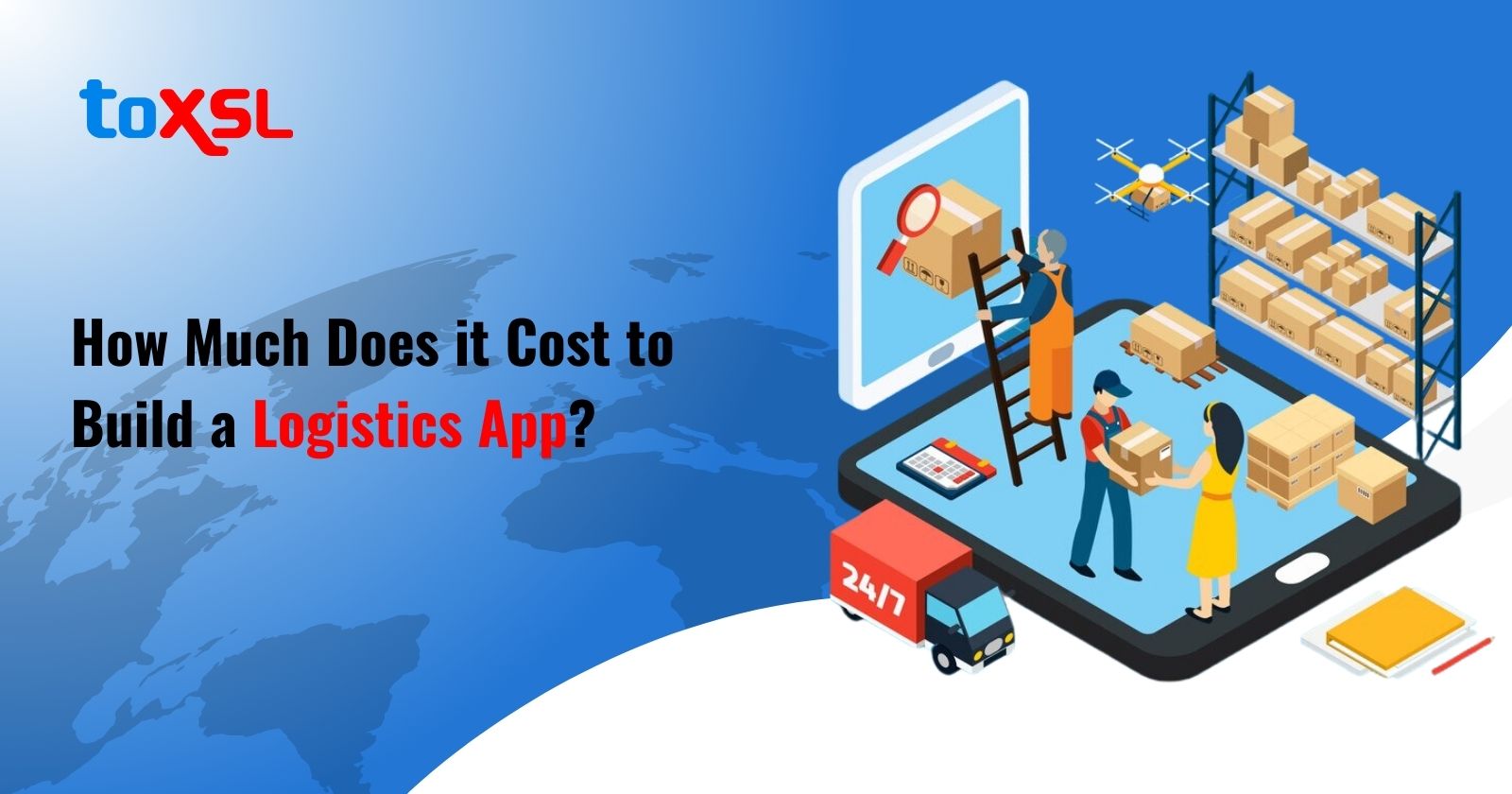- Feb 04, 2025
- Software Development
- 2230
Share this post on:

Managing transportation and logistics operations is crucial for businesses to offer excellent services to customers. The global logistics market is estimated to reach $13,326.3 billion by 2027, at a CAGR of 5.7%. This clearly shows the importance of logistics app development. Today, the world is moving very fast, and the need for better logistics is higher now than ever before.
However, every year, mistakes and delays in transportation and supply chains cost over $15 billion. Big companies and individual carriers often have trouble moving goods. These problems lead to higher prices and make it hard for logistics providers to stay in business.
Now, logistics apps have made things much better for the supply chain and related industries. By removing middlemen, these apps have made the process clearer and increased transparency. Today, many businesses are using on-demand logistics apps, creating a market worth $25.22 billion.
So, if you are willing to learn more about logistic app development, you are in the right place. This blog offers an overview of how on-demand logistics apps work, explains their benefits, and discusses the costs of developing a logistics app.
Key Takeaways:
The total cost of app development depends on complexity, technology stack, design, API integration, quality assurance, maintenance, and development location.
Common app types include fleet management, on-demand logistics, warehouse operations, tracking and dispatching, and supply chain management apps, each handling different aspects of logistics operations.
AI integration is transforming logistics, with AI-driven route planning and warehouse management, improving efficiency and making operations smoother.
Cost of Logistic App Development
The logistic app development cost varies a lot, depending on the app development provider you are considering. Normally, the cost of developing a logistics app ranges from $7,000 to $100,000. However, as we mentioned above, this cost is not fixed and can vary as per the complexity of your app.
Simple Logistic App: Making a simple logistics app consists of basic features such as order tracking, inventory management, and simple reporting. The cost of simple logistic apps ranges from $8,000 to $20,000.
Medium Complexity App: Building a more complex logistics app consists of features like route optimization, barcode scanning, real-time notifications, and easy connection to other services. The development cost of these apps ranges from $20,000 to $50,000.
Advanced Logistics App: If you want to develop a complex logistics app that includes features such as cross-platform development (for both iOS and Android), detailed analytics, and complicated integration with backend systems, the cost ranges from $50,000 or more.
Factors Affecting The Cost of Logistic App Development
Now that we have discussed the cost of logistic app development, it is time to discuss the factors involved in the cost of logistic app development. The following are the key factors that define the cost of logistics app development.
App Complexity: The complexity of a logistics app is one of the most crucial factors that decide the cost of app development. The features of the app, including real-time tracking, route optimization, inventory management, and connections with other services, can increase the overall cost.
Technology Stack: The choice of platform for development, such as iOS, Android, or cross-platform, also affects the cost of development. However, costs can differ, as developing separate apps for various platforms costs more than using a single cross-platform solution. Additionally, using advanced technologies such as GPS and data analytics can add to the overall development expenses.
UI/UX Design: A simple and easy-to-use design is crucial for developing a successful logistics app. The cost of design includes creating an attractive interface, making navigation easy, and improving user experience. Hence, investing in good design can make the app more appealing to users; however, it can enhance the final cost.
API Integration: Logistics apps often need to connect with third-party services, such as mapping tools and payment systems. These connections improve the app’s functionality but add extra costs due to licensing fees and additional development work.
Quality Assurance: After developing an app, careful testing is important to find and fix any bugs in the app. Testing apps is done on different devices and platforms to ensure they work well in various situations in real time.
Maintenance and Updates: After the launch of an app, ongoing maintenance, updates, and support are needed to keep the app working well. Regular updates for new features, security improvements, and technology changes also add to the overall cost.
Geo-location: The cost of developing a logistics app varies depending on where the development team is located. Also, the cost of development is higher in West European countries than in those of Asian countries.
Types of On-Demand Logistics App Development for Business
Wondering what type of logistics app you want for business? Let us move forward in the blog and learn about the various types of on-demand logistics app development for business:
Fleet Management App: The fleet management app stores all the information about a group of vehicles. It helps manage many vehicles in different places. A logistics manager can use this app to see where each vehicle is and what it is doing right now. This app helps managers make quick decisions, which can improve how well things get done.
Logistics On-Demand App: The on-demand app became popular after Uber did well. A logistics on-demand app allows customers to book trucks or other vehicles directly through the app. This saves time for both customers and drivers and helps reduce mistakes.
Warehouse Operations App:Warehouse mobile apps keep track of products before they are loaded onto trucks. Wrong deliveries are a big problem for logistics companies. They can make customers unhappy and hurt the company’s reputation and profits. A good warehouse app can help avoid these problems and make everything work better.
Tracking and Dispatching App: A tracking and dispatch app helps manage shipments by giving quick updates on orders and showing where drivers are in real time. It helps you keep an eye on orders, plan routes, send freight, track vehicles, and make sure products are delivered on time. Using last-mile delivery technology makes the whole delivery process faster and easier.
Supply Chain Management App: Supply chain management software helps businesses see and manage all their logistics activities easily. It keeps all important information about shipments, like delivery times and weights, in one place. With IoT (Internet of Things), it allows real-time tracking of shipments. This software also shows how often shipments arrive, like weekly or monthly. The connected data gives important insights that might be missed otherwise.
Future of logistic app development
Looking at the demand for logistic app development, we can safely say that the future of logistic app development is positive. Logistic app development has made it simple and smooth for businesses to streamline their processes. Furthermore, the emergence of new innovative technologies such as artificial intelligence has made a significant impact on industry, changing every aspect of business and its operations.
According to statistics, the AI in the logistics market size is expected to reach USD 16.95 billion in 2024, at a CAGR of 45.93%.
63% of logistics companies have adopted AI-powered route planning.
These stats state that by incorporating AI in logistics, businesses can greatly enhance their business processes. In the future, we can expect AI-driven logistics and warehouse management apps that will significantly benefit transportation.
Ease Your Business With the top Logistics App Development Company
ToXSL Technology specializes in innovative logistics mobile app development, transforming logistics operations to meet unique business needs. Our experienced team focuses on developing customized applications that align with specific operational goals. We use advanced technologies like real-time tracking, AI insights, and seamless API integrations to enhance logistics efficiency. Our team focuses on customization. Our apps are tailored to fit the client's needs and operational requirements, ensuring they achieve their goals effectively.
At ToXSL Technology, we focus on thorough app testing to offer a smooth user experience, minimizing errors post-launch. Our team’s commitment extends beyond deployment, offering continuous support to adapt to changing business environments.
Wrapping Up
Logistics app development is important for updating how businesses manage their supply chains. The cost of developing a logistics app can change based on the features you want to include. By using new technology and good design, your logistics app can make transportation and supply chain tasks easier, increase transparency, and enhance customer experiences. As the logistics industry expands, using these apps can change how companies work, helping them become more efficient, flexible, and better at satisfying customers. Adopting this trend can lead to a more connected and successful future in logistics.
ToXSL Technologies is a leading logistics app development company that has helped numerous businesses build logistic apps. With more than 12 years in the industry, we have successfully delivered logistic app solutions to businesses globally. Get in touch with us today and learn how we can help you grow.









